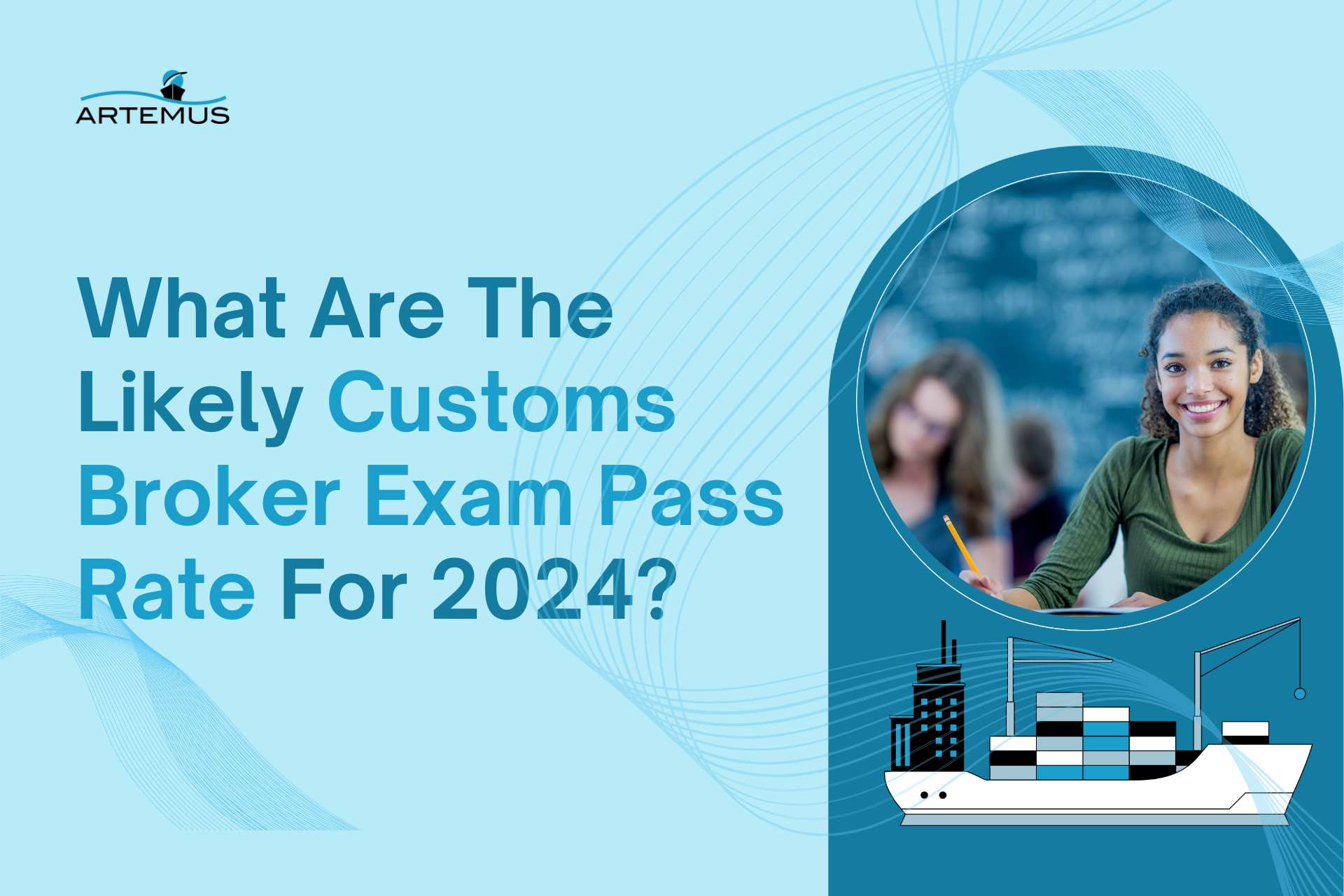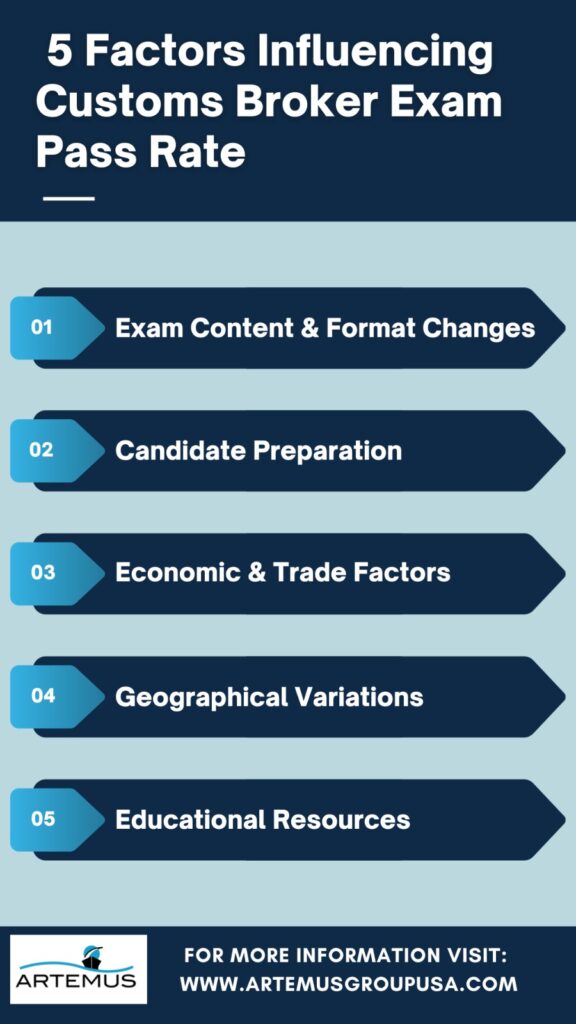
What Is Inbound Logistics & Outbound Logistics? A 2025 Guide
In the dynamic world of supply chain management, understanding the nuances of inbound and outbound logistics is crucial for operational

Becoming a licensed customs broker in the United States is no easy feat. It requires a deep understanding of complex trade regulations, a keen eye for detail, and the ability to navigate the intricate world of international commerce.
The Customs Broker Exam, administered by U.S. Customs and Border Protection (CBP), serves as the gateway to this esteemed profession. But just how challenging is the exam, and what are your odds of success? Let’s find out the customs broker exam pass rate.
In this blog, we’ll delve into the Customs Broker Exam pass rates, shedding light on the journey that aspiring customs brokers undertake. Whether you’re a prospective exam taker seeking insights into the process or simply curious about the profession, understanding these pass rates can provide valuable perspective.
But that’s not all. We’ll also touch upon how technology is transforming the customs brokerage industry. Artemus Transportation Solutions, a leading name in the field, offers cutting-edge customs broker software that’s streamlining operations and boosting success rates for professionals in the industry.
Table Of Contents
The passing score to obtain a Customs Broker License in the United States is 75%. This means that candidates must correctly answer at least 60 out of the 80 multiple-choice questions on the Customs Broker Exam to pass and become eligible for a Customs Broker License.
A Certified Customs Specialist (CCS) or Certified Customs Specialist-Freight Forwarding (CCS-FF) designation from the National Customs Brokers and Forwarders Association of America (NCBFAA) is a different certification from a Customs Broker License issued by the U.S. Customs and Border Protection (CBP).
To obtain these designations, candidates need to meet specific educational and work experience requirements and pass the relevant NCBFAA exams. The passing score for these exams may vary, so it’s advisable to check with the NCBFAA or the specific certification body for the most up-to-date information on passing scores and requirements.
In general, the pass rate for the Customs Broker Exam has historically been challenging, with a significant percentage of candidates not passing. Pass rates have often been in the range of 10% to 20%, meaning that only a minority of candidates successfully pass the exam.
Related: Custom Broker Fees Explained: The Figures You Need To Know
The Customs Broker Exam is a pivotal milestone for individuals aspiring to become licensed customs brokers, enabling them to represent clients in international trade and customs matters. To better understand the exam’s intricacies and its changing landscape, it’s essential to review pass rates over time.
These rates, typically released by agencies like the U.S. Customs and Border Protection (CBP) and the Canada Border Services Agency (CBSA), offer insights into candidate trends and challenges.
Customs Broker Exam pass rates can vary from year to year due to factors like changes in regulations, exam difficulty, and the pool of test-takers. The figures below provide a tentative overview of pass rates over the past decade:
2012: Pass Rate – Approximately 13%
2013: Pass Rate – Approximately 16%
2014: Pass Rate – Approximately 17%
2015: Pass Rate – Approximately 15%
2016: Pass Rate – Approximately 14%
2017: Pass Rate – Approximately 16%
2018: Pass Rate – Approximately 18%
2019: Pass Rate – Approximately 15%
2020: Pass Rate – Approximately 17%
2021: Pass Rate – Approximately 19%
Please keep in mind that these figures are approximate and can vary from one exam administration to another. However, they do provide a general idea of the pass rates customs broker candidates have faced in recent years.
Related: Customs Bond Renewal: All Facts You Need To Know
The Customs Broker Exam has a reputation for being one of the most challenging professional exams, with passing rates that highlight its difficulty.
In 2024, the passing rate remained consistent with previous years, reflecting the complexity of the exam content and the high standards set by customs authorities. Typically, the passing rate for this exam falls between 15% and 20%, although it can vary slightly depending on the exam cycle.
Several factors contribute to the low passing rate. First, the exam covers a wide array of topics, including tariff classification, trade regulations, and customs compliance—each requiring deep understanding and detailed memorization.
Additionally, many examinees find the multiple-choice format challenging, as questions are often structured to test nuanced knowledge of customs law and its application. With only two exam sessions held per year, candidates need to prepare extensively, often dedicating months to studying.
Despite these challenges, passing the Customs Broker Exam can open doors to rewarding careers in customs and trade, offering professionals opportunities in import/export businesses, logistics companies, and government roles.
While the low passing rate may seem daunting, it underscores the importance of thorough preparation, practical experience, and familiarity with customs procedures, making the journey to success all the more rewarding for those who persevere.
The Customs Broker License Exam (CBLE) is a bi-annual assessment held on the fourth Wednesday of both April and October. After the exam, examinees can expect to receive their Exam Results Letters via email within a timeframe of just two weeks from the examination date.
For those seeking to appeal their results, it’s important to note the following timelines: First Appeals must be submitted no later than 60 days from the date Exam Results Letters were dispatched, and Second Appeals should be filed no later than 60 days from the date the First Appeal Results Letters were received.
Now, let’s delve into the pass rates for recent CBLE exams:
The CBLE held on April 26, 2023, unveiled a pass rate of 5.5% before appeal decisions were considered.
On October 26, 2022, the CBLE showcased an 11.1% pass rate prior to the appeal process.
Going back to April 27, 2022, the CBLE exhibited a more favorable pass rate of 39.6% before any appeals were taken into account.
Related: What Is A Customs Bond? A Guide For Importers & Others

Customs Broker Exam pass rates are influenced by a multitude of factors, with five key elements playing a pivotal role in determining candidates’ success.
The Customs Broker Exam is periodically updated to reflect changes in international trade regulations and practices. Alterations to the exam’s content and format can affect pass rates. When the exam becomes more aligned with current industry standards and practices, it may become easier for candidates to pass. Conversely, significant changes that increase the complexity of the exam can lead to lower pass rates as candidates adapt to new challenges.
The level of preparation among candidates plays a significant role in pass rates. Candidates who dedicate sufficient time and effort to study, utilize comprehensive study materials, and seek out effective study strategies are more likely to succeed. Effective preparation is crucial for understanding the intricacies of customs regulations and trade practices, ultimately impacting pass rates.
Economic conditions and trade trends can influence pass rates. For instance, during periods of economic growth and increased international trade, more individuals may seek customs broker licensure. This can lead to higher competition and potentially lower pass rates as more candidates attempt the exam. Conversely, economic downturns may result in fewer candidates and higher pass rates.
Pass rates can vary by region due to differences in trade volumes, industries, and the demand for customs brokerage services. Regions with higher volumes of international trade may have more candidates, leading to lower pass rates as competition intensifies. In contrast, regions with less international trade activity may experience higher pass rates due to fewer candidates and less competition.
The availability and quality of educational resources, including study materials and preparatory courses, can influence pass rates. Candidates who have access to comprehensive and up-to-date resources are better equipped to prepare effectively for the exam. Conversely, candidates with limited access to quality resources may face greater challenges, potentially resulting in lower pass rates.
Related: When Is A Customs Bond Required? Key Factors To Consider
The Customs Broker Exam is a challenging hurdle on the path to becoming a licensed customs broker. Various demographic factors can influence a candidate’s success rate on this demanding examination. Here’s a brief look at how these factors come into play:
1. Educational Background: Candidates with higher education levels, especially in related fields, may have a solid foundation to excel in understanding complex customs regulations.
2. Work Experience: Industry experience, particularly in customs, logistics, or international trade, can provide practical insights crucial for answering exam questions effectively.
3. Language Proficiency: Proficiency in English, the primary language of the exam, is essential for comprehending and responding to its technical questions.
4. Age: Candidates’ age can affect their familiarity with standardised testing, with younger candidates potentially more comfortable with the format.
5. Geographic Location: Location influences access to resources and networking opportunities, impacting a candidate’s preparation and readiness.
6. Socioeconomic Factors: Financial resources play a role in access to study materials, prep courses, and other essential resources.
Related: How To Get A Customs Bond In 5 Easy Steps: Beginner’s Guide
The Customs Broker Exam consists of four main sections:
Section 1: Import Entry and Related Topics – Tentative Passing Rate: Approximately 15% to 20%
Section 2: Harmonized Tariff Schedule (HTS) – Tentative Passing Rate: Approximately 20% to 25%
Section 3: Customs Regulations – Tentative Passing Rate: Approximately 15% to 20%
Section 4: Other Government Agencies (OGA) and Trade Agreements – Tentative Passing Rate: Approximately 15% to 20%
Please note that these passing rates are approximate and can vary from one exam administration to another. Candidates are required to achieve an overall passing score of 75% by performing well across all four sections to pass the Customs Broker Exam.
Related: ISF Bond Cost Breakdown & Management For Import Success
Passing the Customs Broker Exam requires dedication and effective preparation. Here are five tips to improve your chances of success:
1. Start Early & Create A Study Schedule: Begin your preparation well in advance of the exam date. The Customs Broker Exam covers a vast amount of material, so starting early allows you to cover everything thoroughly. Create a study schedule that outlines what topics you’ll cover each day or week. Maintaining a Consistent Study Routine is Crucial.
2. Utilise Official Resources & Study Materials: CBP provides official resources, including the Customs Regulations and the Harmonized Tariff Schedule, which are crucial for the exam. Ensure you have access to these resources. Invest in quality study materials and guides specifically designed for the Customs Broker Exam. Look for reputable publishers and courses.
3. Practice With Past Exam Questions: Practice is essential for success. Obtain past exam papers and practice questions to get a feel for the format and types of questions you’ll encounter. Analyze your performance on practice exams to identify weak areas that need additional attention.
4. Join A Study Group Or Online Community: Joining a study group or an online community of exam takers can provide valuable insights and support. You can discuss difficult concepts, share study tips, and gain a sense of camaraderie. Engaging in discussions with peers can help reinforce your understanding of complex topics.
5. Simulate Exam Conditions: To prepare for the actual exam experience, simulate exam conditions during your practice sessions. Set time limits for each section and strive to complete questions within the allocated time. This helps you become comfortable with the exam’s pace and ensures you can manage your time effectively during the real test.
Related: Late ISF Filing: What To Do If Missed The Deadline?
In the complex world of customs brokerage, where adherence to regulations and efficient processing are paramount, Artemus stands out as the leading software solution. With a proven track record, Artemus is the go-to choice for customs brokers seeking seamless efficiency in their operations. This robust software streamlines the entire customs clearance process, from document preparation to compliance management.
Artemus ensures that brokers stay ahead of the curve with real-time updates on regulatory changes, tariff classifications, and trade agreements. Its user-friendly interface and powerful features empower customs professionals to manage their tasks with precision, saving time and resources while ensuring compliance.
The success rate for the Customs Broker Exam typically ranges from 10% to 20%, making it a challenging and competitive examination.
The passing percentage for the Customs Broker License Renewal (CBLR) exam is generally 75%.
The scope of a customs broker involves facilitating international trade by assisting businesses and individuals in adhering to customs regulations and ensuring the smooth and compliant movement of goods across borders.
The average salary for a customs broker in the U.S. ranges from $60,000 to $100,000 per year, depending on experience, location, and the size of the company.
The CBLR exam is often regarded as difficult due to the extensive knowledge required of customs laws and procedures, but adequate preparation can increase the chances of passing.
Candidates for the customs broker exam must be at least 18 years old, a U.S. citizen or legal resident, and must not have been convicted of any customs-related offenses.
To become a customs officer in the U.S., candidates typically need to pass the Customs and Border Protection (CBP) Officer Exam, along with other assessments.
The customs broker exam in Canada is considered challenging, requiring extensive knowledge of customs regulations and practices; many candidates take preparatory courses.
The customs broker examination assesses an individual’s knowledge of customs laws, regulations, and procedures required to act as a licensed customs broker.
In the U.S., the application fee for the CBLR exam is around $200, but this may vary based on state and other factors; Canadian fees may differ as well.
Required documents for the CBLR exam typically include a completed application form, proof of citizenship or residency, and payment of the exam fee.
An “F card” in customs refers to a specific identification card used for identifying individuals who are authorized to conduct customs-related activities, often in relation to customs broker operations.

In conclusion, the pass rates for the Customs Broker Exam underscore the rigor and complexity of this crucial qualification. With success rates typically hovering between 10% and 20%, it’s evident that becoming a licensed customs broker demands diligent preparation, a deep understanding of customs regulations, and a commitment to staying updated with evolving trade compliance standards.
While the journey may be challenging, those who persevere and successfully pass the exam are well-equipped to navigate the intricate world of customs brokerage, ensuring the efficient and lawful flow of goods across international borders, a pivotal role in the global trade landscape.
Related: Ocean AMS Filing Requirements: 7 Must-Have Documents

In the dynamic world of supply chain management, understanding the nuances of inbound and outbound logistics is crucial for operational

In today’s interconnected world, businesses rely heavily on global trade to expand their markets, access new resources, and drive growth.

Importing goods for resale in the USA presents a lucrative business opportunity, but navigating the complexities of U.S. customs regulations,
Get In Touch
Artemus’ Software Solutions for ISF, AMS, Japan AFR, eManifest Canada, & Panama B2B filings.